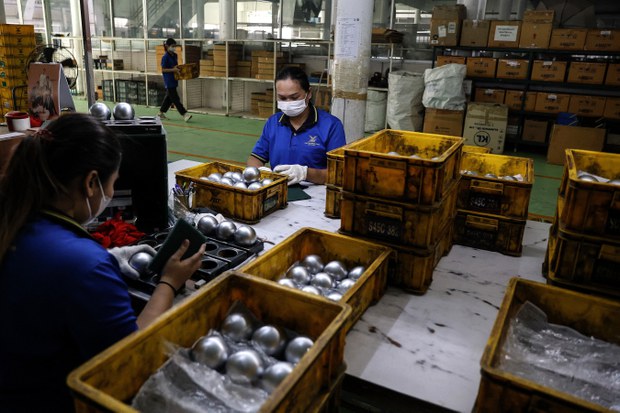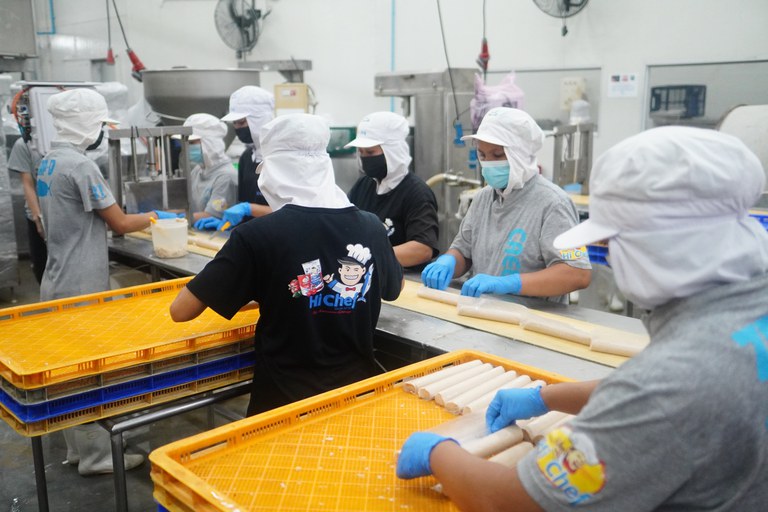Thai business sector warns of job losses, inflation tied to wage hike
2024.07.03
Bangkok
 Workers pack petanque balls at the Football Thai sporting goods factory in Bangkok, Nov. 8, 2023.
Workers pack petanque balls at the Football Thai sporting goods factory in Bangkok, Nov. 8, 2023.
Thailand’s business sector is pushing back hard against the new government’s plan to raise the national minimum wage to 400 baht (U.S. $10.90) per day, warning of severe economic consequences if Prime Minister Srettha Thavisin implements it.
The Thai Chamber of Commerce and industry associations claim the uniform increase in wages could affect 25,000 automotive companies and other employers, and potentially lead to widespread job losses and increased inflation.
“The impact will be on businesses and supply chains. If companies can’t hire people, many will be unemployed,” Atip Peechanon, vice chairman of the Thai Chamber of Commerce, told BenarNews. “There will be a reduction in business expansion and investment. Additionally, consumers will have to bear the increase in the price of goods and services because business costs are rising.
“This will definitely lead to more inflation.”
Srettha and his Pheu Thai party head a ruling coalition that came to power last September on a campaign platform of promising to lift Thailand’s economy out of its COVID-19 doldrums.
Increasing wages uniformly across the country could lead to inequality, warned Apisit Techanitisawat, owner of Anusorn Mahachai Cold Storage in Samut Sakhon and chairman of the central region of the Federation of Thai Industries.
The costs of living are higher in big cities than in small towns, making the problem worse, he said.
“Increasing wages will drive up costs, creating a double impact. Companies will have to raise product prices, affecting production costs by more than 10%,” Apisit told BenarNews.
“We believe many businesses won’t survive, especially the smaller ones, which are more likely to face layoffs due to limited funding and the inability to wait for assistance.”

In place since Jan. 1, the current daily minimum wage ranges from 330 baht ($9) to 370 baht ($10.07), depending on the province. The hotel industry in Bangkok, Krabi, Chonburi, Chiang Mai, Prachuap Khiri Khan, Phang Nga, Phuket, Rayong, Songkhla and Surat Thani has set the minimum wage at 400 baht to stimulate tourism.
In 2023, the “600 baht [$16.32] minimum wage by 2027” policy was a key point in the Pheu Thai party’s election campaign. Despite facing criticism, Prime Minister Srettha and his coalition government have been aiming to implement this policy.
“The sweat of our labor brothers and sisters is the driving force of our country. I will not forget my commitment to raise salaries and minimum wages, reduce expenses, and put more money in our pockets,” Srettha said in a message on May 1, International Workers’ Day.
“I understand the hardships of everyone fighting for a better life.”
That same day, Labor Minister Pipat Ratchakitprakarn announced the increase to 400 baht, effective Oct. 1.
After the announcement, the Thai Chamber of Commerce, joined by more than 50 trade associations, expressed their opposition.
They emphasized that “adjusting minimum wage must be in accordance with labor protection laws and mechanisms from the sub-committee considering the provincial maximum wage rate and a (tripartite) wage commission, rather than being imposed unilaterally by the government.”
The tripartite commission involves unions, employers and government officials.
Simultaneously, Chanintr Chalisarapong, who represents local chambers of commerce throughout the country and 95 trade associations, submitted an open letter to the labor minister announcing their opposition.
‘Scary’ competition from neighbors
Future exports could become increasingly challenging if product prices continue to rise, warned Apisit, the owner of the cold storage business.
“The scary thing is, today we face competition from Vietnam, Indonesia and Malaysia. If our products become expensive, we will lose out, and our market will shrink,” he said.
“If I can’t sell products, I would have to reduce production capacity, which means cutting workers and raw materials. If the government wants to support the people, it should [focus] on reducing the costs of water, electricity and fuel, as these are fundamental living expenses.”

However, the owner of a construction contractor in Bangkok, Apichaya Watcharapreecha, said the higher minimum wage was manageable for her company.
“For our contracting business, which employs around 30 to 40 people, we have always paid wages as required by law. Increasing the wage to 400 baht will affect costs, but I don’t think it will have a significant impact since wages make up less than 30% of the total cost,” Apichaya told BenarNews.
“If this helps employees make a living, it’s beneficial. However, if the wage goes up to 500 baht a day, that will likely make it unsustainable for us.”
Still, a restaurant worker in Bangkok said the new minimum wage would not be enough to live in the capital.
“It’s unfair for entrepreneurs to oppose increasing the minimum wage because 400 baht may not even be enough. Costs are rising every day – green onions are now 200 baht per kilo and pork and chicken are now more expensive. People without debt might be able to manage, but those with debt can hardly survive,” Phuphirat Saisat told BenarNews.
In 2023, the National Statistical Office stated that the average monthly household income in Thailand was 29,502 baht ($802).
Improving wage mechanisms
Associate professor Thanavath Phonvichai, who is president of the University of the Thai Chamber of Commerce, expressed concerns about potential burdens on entrepreneurs.
“This minimum wage hike is largely driven by the election campaign rather than a natural business adjustment mechanism. It burdens entrepreneurs by increasing costs and affecting Thailand’s competitiveness,” Thanavath told BenarNews.
In a report examining the proposed hike in the minimum wage, the Puey Ungphakorn Institute for Economic Research, a think-tank, indicated that food, textile, rubber and electronics production sectors could be hit by the increase. In addition, at least 25,000 automotive companies where employees are paid less than 400 baht per day would have to adjust wages.

Kritsada Theerakosonphong, with the Faculty of Social Administration at Thammasat University, said a good and appropriate mechanism for raising wages is the best solution.
“Why is it that when the government announces increases in fuel, water and electricity costs – which may be higher than labor costs in large industries – the business sector does not object? Business people know that labor costs are less than 10% of total costs,” Kritsada told BenarNews.
“They oppose wage increases because they see workers as being at the bottom of society.”
Kritsada said the tripartite model for wage increases had failed because employee representatives on the committee were not truly representing the workers. Because wages set do not reflect the true needs of the workers, the government should establish a new system where employees participate in setting the minimum wage, Kristada argued.
“The minimum wage is a principle of protection, ensuring workers can work and live within an appropriate time frame [eight hours]. The amount should be discussed by all parties, and there should be a mechanism for regular adjustments,” Kritsada said.







